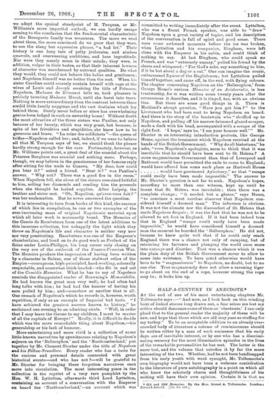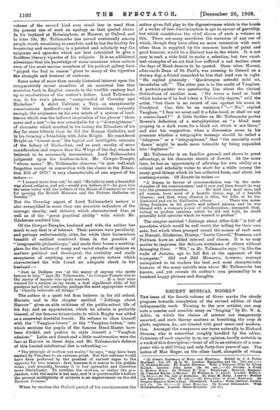HALF-A-CENTURY IN ANECDOTE.* AT the end of one of his
most entertaining chapters Mr. Tollemache says :—" And now, as I look back on this winding bout of linked stories long drawn out, a fear seizes me lest my critics should denounce some of them as chestnuts.' I can only plead that to the general reader the majority of these will be new, and hope that those which are old may pass as stuffing for my turkey." To be an acceptable addition to an already over- crowded body of literature a volume of reminiscences should be written either by a man of such eminence that his early days are of inevitable interest, or by one who has a discrimi- nating memory for the most illuminative episodes in the lives of the remarkable personalities he has met. The latter is the surer test, and the volume that satisfies it by far the more interesting of the two. Whether, had he not been handicapped from his early youth with weak eyesight, Mr. Tollemaohe's own biography would not have been a welcome contribution to the literature of pure autobiography is a point on which all who know the scholarly charm and thoughtfulness of his writing will have their own opinion. Certain it is that no
• Old. and Odd Montories. By the lion. Lionel A. Tollemache. London, Edward Arnold. [12s. 61. net.]
volume of the second kind ever stood less in need than the present one of such an apology as that quoted above. In his boyhood at Helmingham, at Harrow, at Oxford, and • in later life, Mr. Tollemache has moved continually among people worth visualising in anecdote, and he has the facility for treasuring and recounting in a pointed and scholarly way the epigrams and episodes which are best calculated to give a • faultless literary vignette of his subjects. It is an additional advantage that his knowledge of some occasions when certain • even of the most serious members of his portrait gallery have "played the fool in season" gives to many of the vignettes • the strength and humour of cartoons.
Some notes of more than merely historical interest upon the comparatively recent members of an ancestral line that stretches back in English records to the twelfth century lead up to recollections of the author's father. Lord Tollemache was, in his son's phrase, "compounded of Coverley and Richelieu." A strict Calvinist, a Tory, an exceptionally
conscientious landlord—and in this connexion, curiously enough, the originator on his own estate of a system of land- tenure which was the indirect inspiration of the phrase "three acres and a cow "—he was remarkable for a "downrightness" of character which resulted in his hating the Ritualists of his day far more bitterly than he did the Roman Catholics, and In his forming a friendship with John Bright. He considered Bright an "honest man," the logical and intelligible outcome of the fallacy of Radicalism, and as such worthy of more consideration and respect than the Whigs of the day, whom he believed to be necessarily inconsistent. Lord Tollemache's judgment upon his brother-in-law, Mr. Cowper-Temple, "whose name," Mr. Tollemache observes, "is now well-nigh forgotten except in connection with the clause in the Educa- tion Bill of 1870," is very characteristic of one aspect of his nature :—
• "I cannot make him out,' he said. 'He talks in such a beautiful .way about religion, and yet—would you believe it ?—he goes into the same lobby with the infidels of the House of Commons to vote for opening the British Museum and the Picture Galleries on Sunday."
But the Coverley aspect of Lord Tollemache's nature is also exemplified in more than one anecdote indicative of the courage, charity, and chivalry which characterised him, as well as of the "great practical ability" with which Mr. Gladstone credited him.
Of the Cowper-Temples, husband and wife, the author has much to say that is of interest. Their natures were peculiarly, and perhaps unfortunately, alike, for while their harmonious breadth of outlook combined them in the practice of "irrepressible philanthropy," and made their house a meeting.
place for the holders of many and varied shades of opinion on matters political and theological, the credulity and ready aeceptance of anything new of a psychic nature which characterised the wife found no adequate check in her husband :- "Just as Oedipus was 'at the mercy of anyone who spoke terrors to him," says Mr. Tollemache, "so Cowper-Temple was at
the mercy of anyone who spoke marvels If a text were wanted for a sermon on my uncle, a text significant alike of his goodness and of his credulity, perhaps the most appropriate would be 'Charity believeth all things.'"
The author is a quiet but firm believer in his old school, Harrow, and in the chapter entitled "Jottings about Harrow" gives an able criticism of the public-school life of his day, and an appreciation, which he admits is probably biassed, of the famous triumvirate, to which Rugby was added as a somewhat doubtful fourth. He refuses to class himself with the "Vaughan-lovers" or the " Vaughan-haters," into whioh sections the pupils of the famous Head-Master have been divided, and prefers to style himself a "Vaughan admirer." Latin and Greek and a little mathematics were the
fare at Harrow in those days, and Mr. Tollemache's defence of this limited intellectual diet is refreshing "The principle of malt urn non muita," he says, "may have been earried by Vaughan to an extreme point. But this extreme would Lava been preferred by the greatest of ancient sages to the opposite for two reasons : first, because it is nearer to the golden mean ; and Secondly, because it is less agreeable and therefore more discIplivary. To combine the muitum, or rather the pro- /endues. with the emits is not easy, and it is questionable whether the present multiplicity of subjects is an improvement on the old Harrow Trivium."
When be reaches the Oxford period of his reminiscences the
author gives full play to the digressiveness whioh in the hands of a Writer of less discrimination is apt to savour of garrulity, but which constitutes the chief charm of such a volume as this. There are many anecdotes the omission of any one of which, though they have often no more connexion with each other than is supplied by the common bonds of point and good humour, would be a distinct loss to the whole. It is not easy in such a wide field to make a selection, but two excel- lent examples of an art that has suffered a sad decline since the days of Hood deserve to be quoted. Once when Mansel, afterwards Dean of St. Paul's, was crossing to Ostend on a stormy day, a friend remarked to him that land was in sight. " He replied piteously : Quodcunque oslendis mill sic, incredulus odi." The other pun is to the credit of Vaughan.
A portrait-painter was questioning him about the clerical distinctions of another man. "He wears a hood or band which looks as if be had taken a University degree," said the artist, "but there is no record of one against his name in Crockford. Can this be an omission ? "—" No," replied
Vaughan, "I fear we must call it a false-hood, or shall we say a contra-band ? " A little further on Mr. Tolleinache quotes Bowen's definition of a metaphysician as "a blind man groping in a dark room for a black cat which is not there," and also his suggestion, when a discussion arose in his presence whether a telegraphic message should be called a "telegram" or a " telegrapbeme," that "the unsaintly word ' damn ' might be made more tolerable by being expanded into dapheme."
Mr. Tollemache is on familiar ground, and shows to great
advantage, in his character sketch of Jowett. At the same time, he has an opportunity of allowing his own ability as a critical and scholarly writer to show for a while among the many good things which he has collected from, and about, his contemporaries. Of Jowett be writes :- "A dogma in favour of accommodation was 'in the ante- chamber of his consciousness,' and it now and then forced its way
into the presence-chamber He held that most men, and all women, have need of a beatific vision, nay, of a beatific illusion ; and that, when illusion is bliss, 'tie folly to be dis- illusioned and sin to disillusion others There was some. thing feminine in his gentle and refined nature, and he was blessed with a woman's power of self-deception ; insomuch that, hating to profess opinions which he did not hold, he could generally hold opinions which he wanted to profess."
The chapter entitled "Jottings about After-Life" is full of anecdotes which would be well worth the telling for their own
sake, but which when grouped round the names of such men as Disraeli, Gladstone, Huxley, " Lewis Carroll," Freeman, and Pattison have an added interest and charm. It is no easy matter to imprison the delicate witticisms of others without damaging them. "Wit," as Mr. Tollemache says, "is, like the walls of Jericho, apt to fall flat at the approach of the
trumpeter." Old and Odd Memories, however, conveys unimpaired to its readers the best and most characteristic humour of the many notable men whom Mr. Tollemache hag known, and yet reveals its author's own personality in a hundred happy phrases and thoughts.







































 Previous page
Previous page